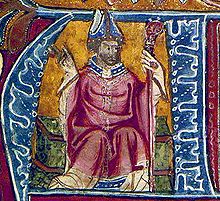Robert Grosseteste
Robert Grosseteste (* before 1170 ; † October 9, 1253 ) was an English theologian , philosopher and Bishop of Lincoln .
Life
Coming from poor Anglo-Norman backgrounds, Grosseteste studied the artes liberales at the cathedral monastery in Hereford before 1190 and was accepted into the service of the local bishop. He then studied theology in Paris and was perhaps the first Chancellor of Oxford University in 1214 . In 1225 he, who was still a deacon , received his clerical beneficiaries; in 1229/1230 he took care of the theological training of the English Franciscans .
1235 became the greatest bishop in Lincoln. He looked after his diocese, who identified himself with the church reforms decided on at the 4th Lateran Council (1215), in pastoral care and administration. His own reform impetus brought him, especially after the Council of Lyon (1245), into increasing opposition to the papacy. So he presented Pope Innocent IV (1243–1254) with a memorandum in 1250 in which he criticized the papal granting of benefits and made them responsible for the grievances in the English Church. In the last year of his life, Grosseteste had to grapple with a case of papal benefices (to the nephew of the Roman bishop) even at his own cathedral in Lincoln.
Robert Grosseteste died on the night of October 8th to 9th, 1253. Various attempts at canonization ( canonization ) were unsuccessful.
Works
Many works by Robert Grosseteste have come down to us. Grosseteste was considered a master of Aristotelian logic , as an observer of natural phenomena (optics, climate, form, movement, time), which he analyzed with mathematics and geometry , as a translator from the Greek (Aristotelian ethics, writings of John of Damascus and Pseudo -Dionysius ), as a metaphysician ("God is light"). In three works - Compotus , Compotus Minor , Compotus Correctorius - he dealt with the Computus . A fourth work with u. a. Carmen de mundo et partibus is attributed to this topic (Axel Bergmann: Carmen de mundo et partibus , Frankfurt am Main 1990). Scriptural commentary, for example a hexaemeron , sermons and an allegorical poem about redemption ( Château d'Amour ) round off the literary oeuvre of the important conservative church scholar. His theories of light paved the way for experimental optics ; his work was continued by Roger Bacon .
literature
- Alistair Cameron Crombie : Robert Grosseteste and the Origins of Experimental Science, 1100-1700 . Oxford: Clarendon Press 1953, ISBN 0-19-824189-5
- Richard C. Dales: Robert Grosseteste's Scientific Works , in: Isis 52 (1961), 381-402.
- John Flood (Ed.): Robert Grosseteste and his intellectual milieu. New editions and studies . Pontifical Institute of Mediaeval Studies, Toronto 2013. ISBN 978-0-88844-824-8
- Klaus Kienzler : Robert von Grosseteste. In: Biographisch-Bibliographisches Kirchenlexikon (BBKL). Volume 8, Bautz, Herzberg 1994, ISBN 3-88309-053-0 , Sp. 444-446.
- GV Lechler: Robert Grosseteste, Bishop of Lincoln. Leipzig 1867.
- James McEvoy: Robert Grosseteste , Oxford: Oxford University Press 2000. authoritative introductory overall presentation
- James McEvoy: Robert Grosseteste. Exegete and Philosopher. 1994 collection of articles
- James McEvoy: The Philosophy of Robert Grosseteste , Oxford: Clarendon Press 1986. Standard work
- James McEvoy: Robert Grosseteste . In: Lexicon of the Middle Ages (LexMA). Volume 7, LexMA-Verlag, Munich 1995, ISBN 3-7608-8907-7 , Sp. 905-907.
- Steven P. Marrone: William of Auvergne and Robert Grosseteste : New Ideas of Truth in the Early Thirteenth Century, Princeton NJ: Princeton University Press 1983.
- Richard Southern: Robert Grosseteste : The Growth of an English Mind in Medieval Europe, Oxford: Clarendon Press 2 A. 1992.
Web links
- Literature by and about Robert Grosseteste in the catalog of the German National Library
- International Robert Grosseteste Society
- Works
- Secondary literature
- Entry in Edward N. Zalta (Ed.): Stanford Encyclopedia of Philosophy .
- Ulf von Rauchhaupt : And there was light , FAZ online, August 3, 2014.
| predecessor | Office | successor |
|---|---|---|
| Hugh of Wells |
Bishop of Lincoln 1235–1253 |
Henry of Lexinton |
| personal data | |
|---|---|
| SURNAME | Robert Grosseteste |
| BRIEF DESCRIPTION | English theologian and Bishop of Lincoln |
| DATE OF BIRTH | before 1170 |
| DATE OF DEATH | October 9, 1253 |
